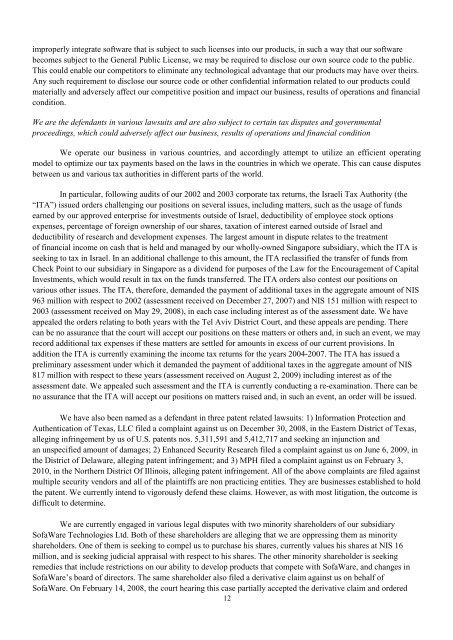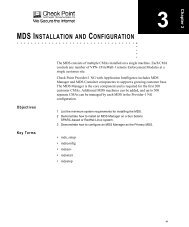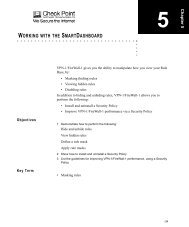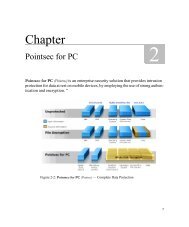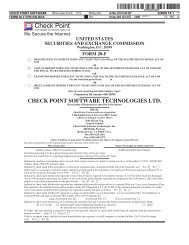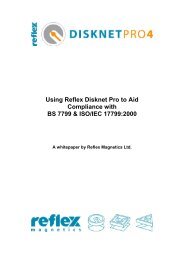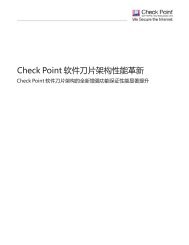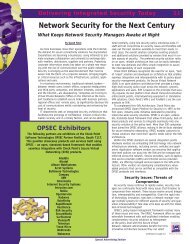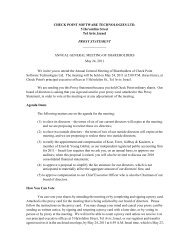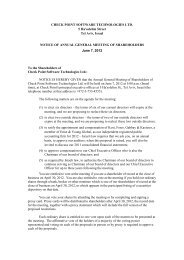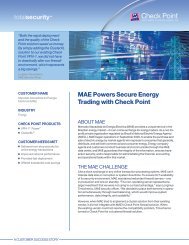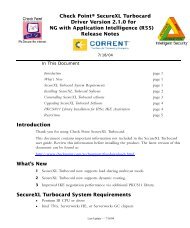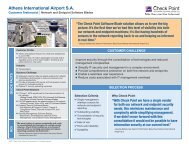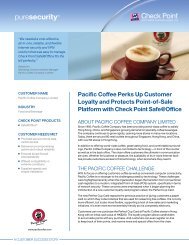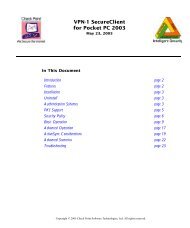FORM 20-F - Check Point
FORM 20-F - Check Point
FORM 20-F - Check Point
You also want an ePaper? Increase the reach of your titles
YUMPU automatically turns print PDFs into web optimized ePapers that Google loves.
improperly integrate software that is subject to such licenses into our products, in such a way that our software<br />
becomes subject to the General Public License, we may be required to disclose our own source code to the public.<br />
This could enable our competitors to eliminate any technological advantage that our products may have over theirs.<br />
Any such requirement to disclose our source code or other confidential information related to our products could<br />
materially and adversely affect our competitive position and impact our business, results of operations and financial<br />
condition.<br />
We are the defendants in various lawsuits and are also subject to certain tax disputes and governmental<br />
proceedings, which could adversely affect our business, results of operations and financial condition<br />
We operate our business in various countries, and accordingly attempt to utilize an efficient operating<br />
model to optimize our tax payments based on the laws in the countries in which we operate. This can cause disputes<br />
between us and various tax authorities in different parts of the world.<br />
In particular, following audits of our <strong>20</strong>02 and <strong>20</strong>03 corporate tax returns, the Israeli Tax Authority (the<br />
“ITA”) issued orders challenging our positions on several issues, including matters, such as the usage of funds<br />
earned by our approved enterprise for investments outside of Israel, deductibility of employee stock options<br />
expenses, percentage of foreign ownership of our shares, taxation of interest earned outside of Israel and<br />
deductibility of research and development expenses. The largest amount in dispute relates to the treatment<br />
of financial income on cash that is held and managed by our wholly-owned Singapore subsidiary, which the ITA is<br />
seeking to tax in Israel. In an additional challenge to this amount, the ITA reclassified the transfer of funds from<br />
<strong>Check</strong> <strong>Point</strong> to our subsidiary in Singapore as a dividend for purposes of the Law for the Encouragement of Capital<br />
Investments, which would result in tax on the funds transferred. The ITA orders also contest our positions on<br />
various other issues. The ITA, therefore, demanded the payment of additional taxes in the aggregate amount of NIS<br />
963 million with respect to <strong>20</strong>02 (assessment received on December 27, <strong>20</strong>07) and NIS 151 million with respect to<br />
<strong>20</strong>03 (assessment received on May 29, <strong>20</strong>08), in each case including interest as of the assessment date. We have<br />
appealed the orders relating to both years with the Tel Aviv District Court, and these appeals are pending. There<br />
can be no assurance that the court will accept our positions on these matters or others and, in such an event, we may<br />
record additional tax expenses if these matters are settled for amounts in excess of our current provisions. In<br />
addition the ITA is currently examining the income tax returns for the years <strong>20</strong>04-<strong>20</strong>07. The ITA has issued a<br />
preliminary assessment under which it demanded the payment of additional taxes in the aggregate amount of NIS<br />
817 million with respect to these years (assessment received on August 2, <strong>20</strong>09) including interest as of the<br />
assessment date. We appealed such assessment and the ITA is currently conducting a re-examination. There can be<br />
no assurance that the ITA will accept our positions on matters raised and, in such an event, an order will be issued.<br />
We have also been named as a defendant in three patent related lawsuits: 1) Information Protection and<br />
Authentication of Texas, LLC filed a complaint against us on December 30, <strong>20</strong>08, in the Eastern District of Texas,<br />
alleging infringement by us of U.S. patents nos. 5,311,591 and 5,412,717 and seeking an injunction and<br />
an unspecified amount of damages; 2) Enhanced Security Research filed a complaint against us on June 6, <strong>20</strong>09, in<br />
the District of Delaware, alleging patent infringement; and 3) MPH filed a complaint against us on February 3,<br />
<strong>20</strong>10, in the Northern District Of Illinois, alleging patent infringement. All of the above complaints are filed against<br />
multiple security vendors and all of the plaintiffs are non practicing entities. They are businesses established to hold<br />
the patent. We currently intend to vigorously defend these claims. However, as with most litigation, the outcome is<br />
difficult to determine.<br />
We are currently engaged in various legal disputes with two minority shareholders of our subsidiary<br />
SofaWare Technologies Ltd. Both of these shareholders are alleging that we are oppressing them as minority<br />
shareholders. One of them is seeking to compel us to purchase his shares, currently values his shares at NIS 16<br />
million, and is seeking judicial appraisal with respect to his shares. The other minority shareholder is seeking<br />
remedies that include restrictions on our ability to develop products that compete with SofaWare, and changes in<br />
SofaWare’s board of directors. The same shareholder also filed a derivative claim against us on behalf of<br />
SofaWare. On February 14, <strong>20</strong>08, the court hearing this case partially accepted the derivative claim and ordered<br />
12


